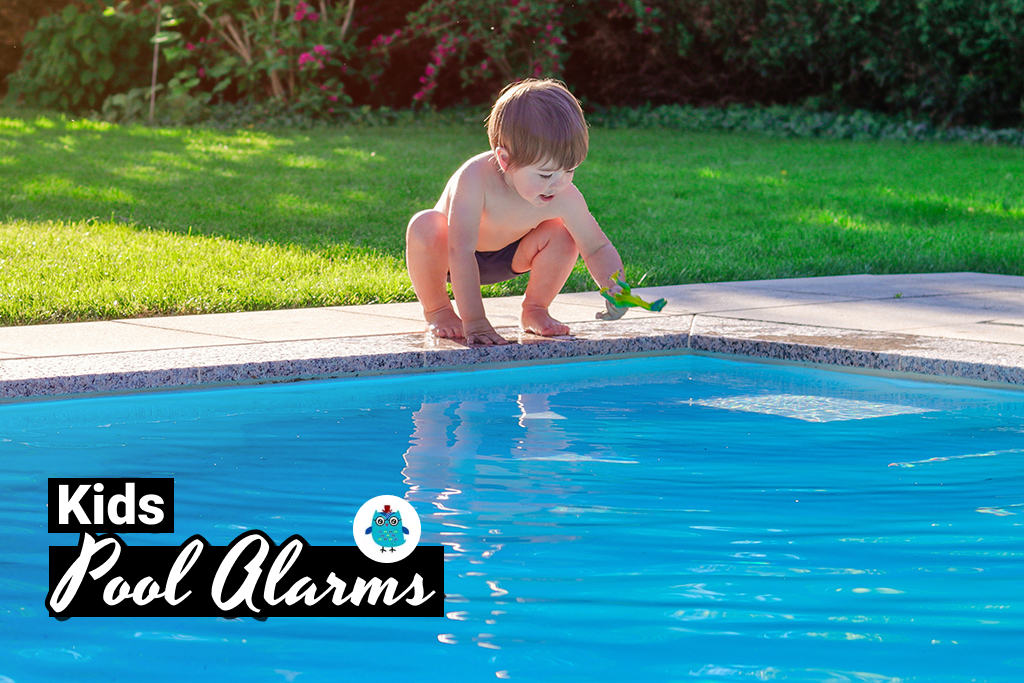Explore the best pool alarms for kids in this comprehensive guide. From wearable to floating alarms, ensure your child’s safety and gain peace of mind.
Having kids and a pool to splash in your backyard sounds fun. And it should be. However, we know this is not always a perfect combination. Some risks come with owning a pool. And we are responsible for everything that can happen, including injuries and fatal accidents.
The responsibility of parenting can sometimes feel overwhelming, especially when our children seem drawn to water like ducks. Installing safety equipment, such as a pool alarm, becomes even more of a necessity as hot summer days keep rolling in.
Whether it’s a floating pool alarm for your in-ground pool, an above-ground sensor system, or even a pool door alarm, these devices provide much-needed peace of mind.
This article presents some of the best pool alarms in the market today. I included products for each type of device. I will also answer important questions about these products.
After reading the following guide, you will know exactly which pool alarm is the best to protect your kid.
This article will cover these types of pool alarms:
- Best Floating Sensor for Above Ground Pool
- Best Immersion Sensor for In-ground Pool
- Best Pool Door Alarm
- Best Wearable Bracelet Pool Alarm
Need more help choosing a pool alarm?
As parents, we always aim to create the safest environment for our children. Let’s dive in.
Not sure which pool safety device you need? Explore my list of the must-have pool safety devices when you have children. This carefully curated guide is the result of numerous hours of research and my own experience as a dad and pool owner.
🤗 Transparency Statement: This page may contain affiliate links. If you make a purchase through these links, I may earn a commission at no extra cost to you. Rest assured, I only promote products I trust. Thanks for your support!
Understanding Pool Alarm Systems
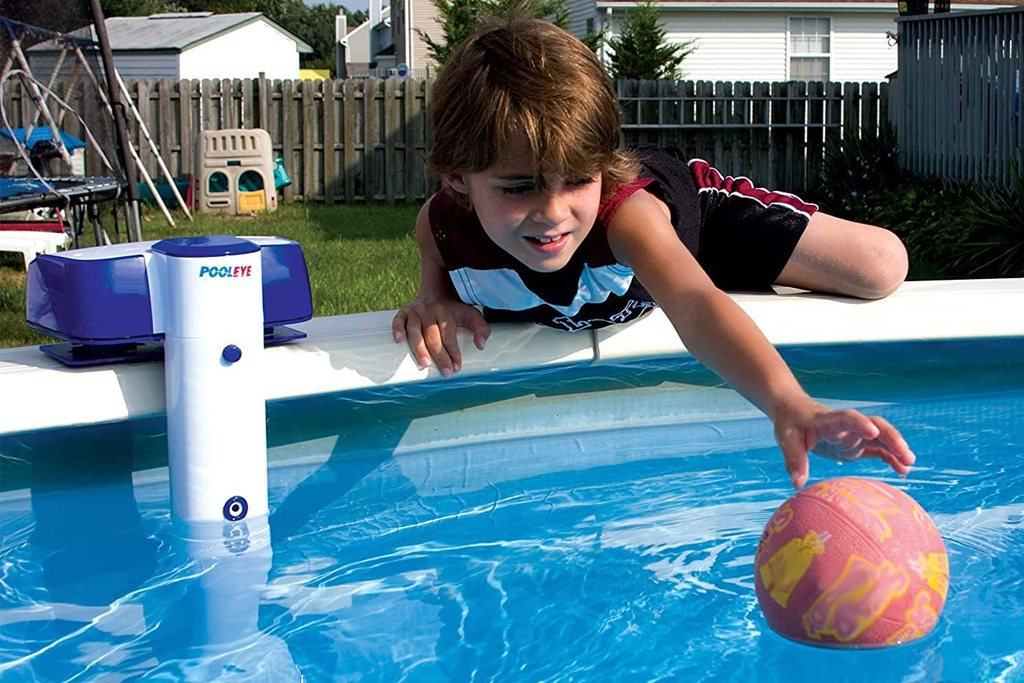
Having a pool for you and your kids to jump into when the day gets hot provides fun for the whole family. But as an owner, it’s also your responsibility to ensure your pool doesn’t become a dangerous place to have around.
In the US, an average of 11 drowning deaths and 22 non-fatal drownings occur each day. Most of these accidents are avoidable.
What are the Different Types of Pool Alarms
- Surface Wave and Floating Alarm: These devices are either placed above the water or on the water’s surface. It detects a significant change in the size of the waves. If the input reaches a set threshold, the alarm goes off. People find specific alarms under this category too sensitive for convenience. Since wind, rain, and smaller objects like a leaf can disturb the water, some devices often send false alarms.
- Sub-Surface Detection: These are installed at one part of the pool with its sensor dipped into the water. These devices detect sudden changes in water pressure. The alarm is triggered if an object big or heavy enough enters the water. This makes it less sensitive than surface devices, making fewer false positives.
- Wearables Bracelet: These are devices worn as wristbands or collars. Contact with water triggers the alarm, alerting you when your kid has entered the pool.
- Pool Gate Alarm: Gates leading to the pool area are equipped with these sensors. It alerts you if someone opens the gate so you can go and check. This type of alarm is less susceptible to false alarms since most pool gates have a self-latching feature. It can only be triggered intentionally.
How Do Pool Alarms Work?
A pool alarm’s mechanism depends on what type of device it is. A surface wave or floating alarm will work differently than a sub-surface detection alarm. Gate and wearable ones are also entirely separate cases.
Floaties have sensors that are triggered when a significant change in water surface activities occurs. On the other hand, immersive sensors send alerts when something enters the water, causing a difference in the surrounding pressure. Wearables are simpler devices that send signals regarding contact with water. Finally, gate alarms are mostly pairs of sensors triggered when they lose contact with each other.
Why Do I Need a Pool Alarm?
Installing safety equipment such as pool alarms is crucial to keeping your pool area safe. And it’s not only about the safety of your kids. It is also possible that someone else’s kid would fall into your pool by accident. But intruders are not exclusively people. Pets are also vulnerable to growing in backyard pools.
Are Pool Alarms Required by Law?
The law regarding the requirement of alarms for residential pools varies from state to state, city to city, or town to town. Some states, like California, require pool owners to install at least two safety features. I advise that you see the specific requirement your area or region has.
It’s best to have all the possible safety devices and measures in place to avoid tragedies. You might even be legally liable if an accident happens.
Factors to Consider When Choosing a Pool Alarm
When looking for the right product, weigh your options against your unique situation. The common features you might find the most helpful are as follow:
- Alarm/siren volume: The products on this list have alarm volumes between 85 to 100 decibels. The loudness of the device can either help you to secure your pool or annoy your neighbors. You should choose the one with the most appropriate alarm volume.
- Remote/in-door alarm: This additional device will augment the capability of your pool alarm. It sounds off an alert simultaneously with the one by the pool whenever something large enough enters the water. With this installed inside the house, there’s no chance you won’t hear. The average effective range for a remote alarm is 200 feet.
- Motion sensor: There are several ways alarms are triggered. For smaller pools, a floating alarm works best for you. These are also easier to install. On the other hand, underwater sensors are less likely to produce false alarms and are suitable for bigger pools.
- Controls: Some of the alarms mentioned here require magnetic keys. Other users find it a bit tricky, but having this feature also adds security. It means the only person who can turn the alarm off or turn on ‘swim mode’ is the one who has the key. This works perfectly against intruders.
Now that you’re familiar with the features let’s look at some of the products. Here are the best ones you’d want to seriously consider.
Best Floating Sensor Alarm for Above Ground Pool
Floating alarms are among the easiest to set up. You won’t need to drill holes around your pool. Simply put in the battery, make a few sensitivity adjustments, and leave it floating on the water. Just tie it to one side of the pool so it won’t float around.
The Floating Pool Alarm
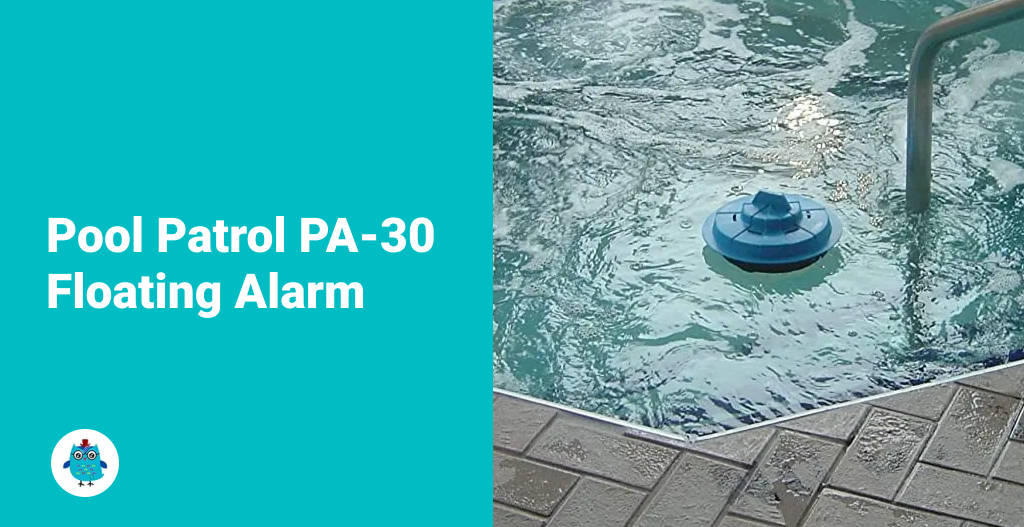
For larger swimming pools, use Pool Patrol PA-30 alarm . It’s recommended for pools up to 20 by 40 feet. Its price is also quite larger, at around $200.
. It’s recommended for pools up to 20 by 40 feet. Its price is also quite larger, at around $200.
You can adjust its sensitivity by giving the rotating base a twist. This is also how you turn the alarm off, which is way easier.
At 100.4 decibels, this is loud enough for you to hear but not too loud to cause a scandal. It also has a remote receiver with an effective range of 200 feet.
Pool Patrol uses a 9 volts battery that you install underneath.
Pros
- Easy to install and turn off
- Adjust the sensitivity to the most convenient
- The louder alarm ensures you won’t miss it
- Not so bulky design
Cons
- Expensive
- You’ll need to pick it up from the pool to make an adjustment
- The sensor needs to be fine-tuned
For all details, check out the Pool Patrol PA-30 on Amazon here!
The Smart Floating Pool Alarm with App
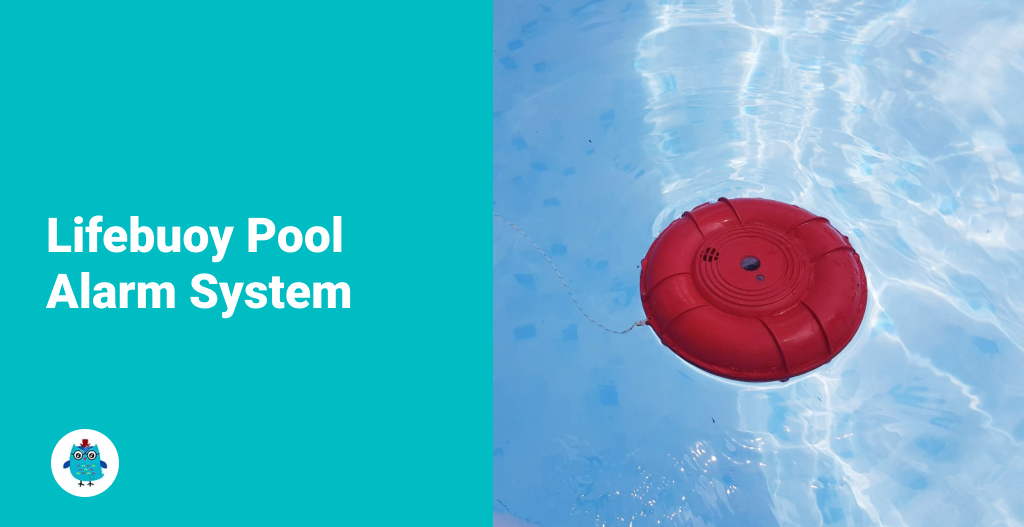
This pool alarm is among the few, if not the only, alarm that alerts you when the pool cover is removed.
It’s a smart floating device that reacts independently after 10 minutes of no water activity. Adjust the sensitivity or switch the alarm off via the phone app. With a Bluetooth connection, you can modify the device’s settings without getting wet. The app only works with the alarm when you’re at home or within range.
Use Lifebuoy for mid-range pool size. Its long-range RF detection is sensitive enough to alert you of any movements in the water. For larger pools above 40 feet, I’d suggest using 2 devices at both ends.
Compared to the previous floating alarms, this is better. But it’s also more expensive, at $300. Use a 9 volts battery with this device as well.
Pros
- Works with a pool cover
- Easily modify its settings or turn the alarm off hands-free
- Alerts you via the app and indoor unit
- Reactivates on its own from swim mode
Cons
- Expensive
- Takes a bit of time to reactivate from swim mode
- Requires a reliable wireless connection
For all details, check out the Lifebuoy Pool Alarm System on Amazon here!
Best Immersion Sensor for In-ground Pool
It is also known as a sub-surface detector. These alarms are fixed at one part of the pool. Some models require drilling holes to set the device in place.
Among other types of alarms, these ones are far less likely to disturb you with false alarms. The underwater sensor is only triggered by changes in pressure, so surface activities like a falling leaf won’t set it off.
The Above-ground Pool Immersion Alarm
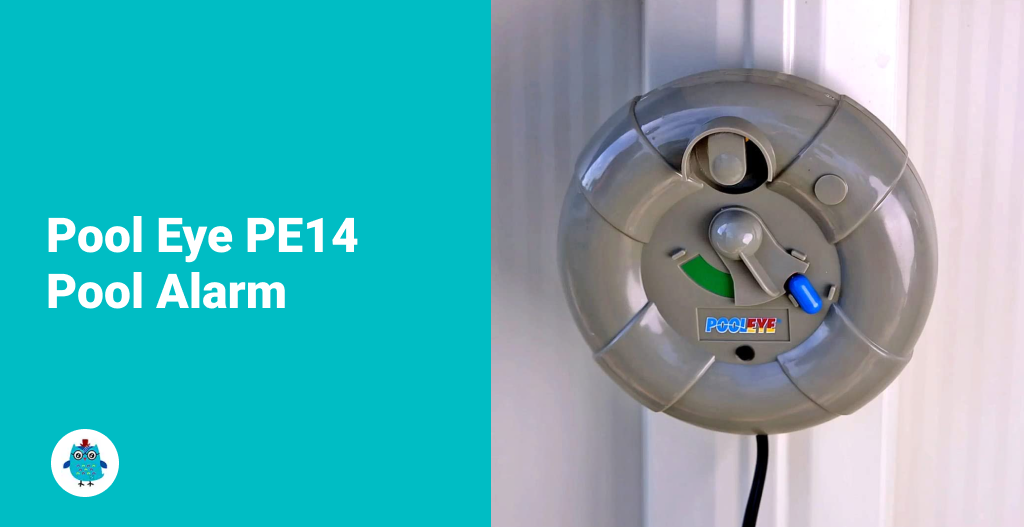
Maintain your pool’s safety for children and pets for only $60 to $80.
This immersion sensor emits a loud siren of 85 decibels, enough for anyone nearby to hear.
This device can detect objects, little kids, and animals as light as 15 pounds. But since it uses an underwater motion detector, rain, and wind are less likely to cause false alarms.
PE14 pool alarm is most suitable for above-ground pools measuring 16 by 32 feet or around 24 feet.
This device is battery-operated. It also requires a magnetic key to shut off the alarm.
Pros
- Affordable
- Fewer false-positives
- Works with small children
- Good for average-size pool
Cons
- No in-home remote
- It may not be loud enough if the pool is farther from your house
- You might misplace the key and not be able to shut the alarm off
For all details, check out the PoolEye PE14 Pool Alarm on Amazon here!
The Versatile Pool Alarm System
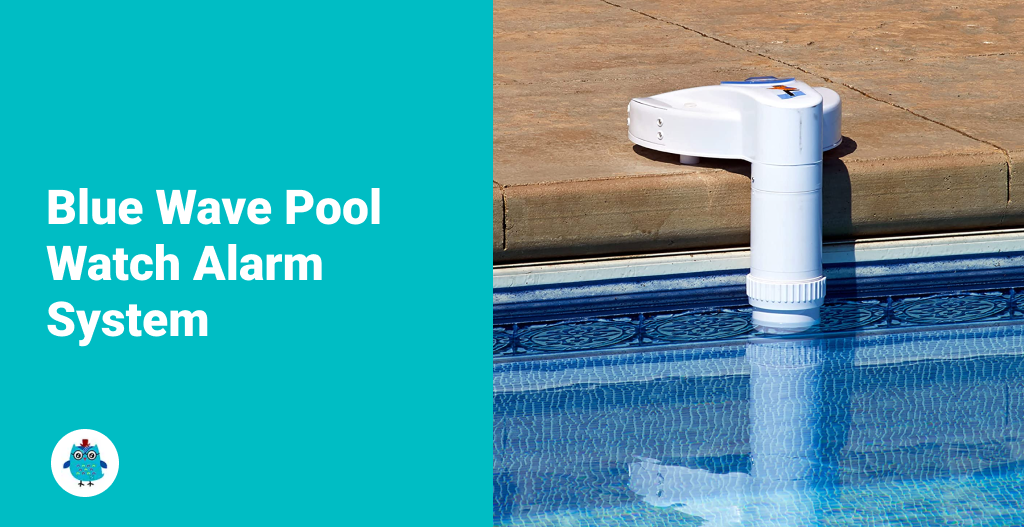
Blue Wave Pool Watch Alarm System
This pool alarm is suitable for both in-ground and above-ground pools.
This immersion sensor can detect if an object weighing above 18 pounds has entered the water. So this will work with older toddlers and bigger pets.
An in-home alarm comes with the package. However, its effective range is short at 100 feet. But if you have a small house, this should be fine.
You need to drill on a platform or the pool rail for installation, which some people find too cumbersome.
Pros
- Not too sensitive to rain and wind
- Good if you have older kids or a big dog
- Comes with an in-home remote
- Suitable for any pool
Cons
- The receiver’s range can be improved
- You need to drill to install the device
- Not advisable if you have younger toddlers and puppies
For all details, check out the Blue Wave Poolwatch Alarm System on Amazon here!
The best way to keep your kids secured when you own a pool is to get one alarm and a combination of at least two pool alarms.
Best Pool Door Alarm
This device is installed on gates and other entrances to the pool area. Since it alerts you as your kid or pet passes through the threshold, you can prevent potential disasters even before they happen with this type of alarm.
Strengthen your pool security. Add this pool door alarm to work alongside a sub-surface or floating alarm.
The Smart Pool Gate Sensor Alarm
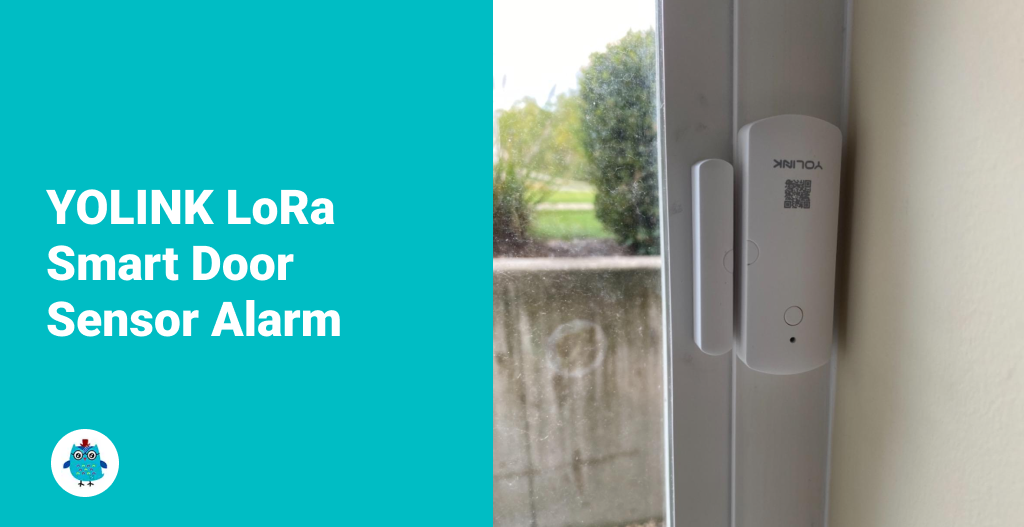
Kickstart your smart home security with this comprehensive set! The YoLink LoRa Smart Door Sensor kit includes one YoLink Hub and four Door Sensors. Batteries are pre-installed and can last up to 5 years before needing a replacement. This system supports over 300+ devices from our full product line. For larger homes or high-rise buildings, add more hubs.
Self-monitoring is a breeze with YoLink. There’s no need for monthly fees when you can secure your home or business for free. Be in the know with instant notifications for alarms and off-normal events.
Pros
- Comprehensive kit with easy installation
- No monthly fees for self-monitoring
- Versatile uses beyond just door security
- Unique Door Left-Open reminder
- Advanced technology ensures system reliability
- Superior range with LoRa technology
Cons
- Requires stable internet connection for full functionality
- Additional devices for an expanded system may increase the cost
For all details, check out the YOLINK LoRa Smart Door Sensor on Amazon here!
Best Wearable Pool Alarm
This wearable wristband device helps you look after your kid while being kid-friendly and fashionable.
Unlike other alarm types, this requires little to no installation. With simple plug-and-play, you can have better security while cooling off by the pool or beach.
Of all the products on this list, this is the most convenient one.
The Bracelet Pool Alarm for Kids
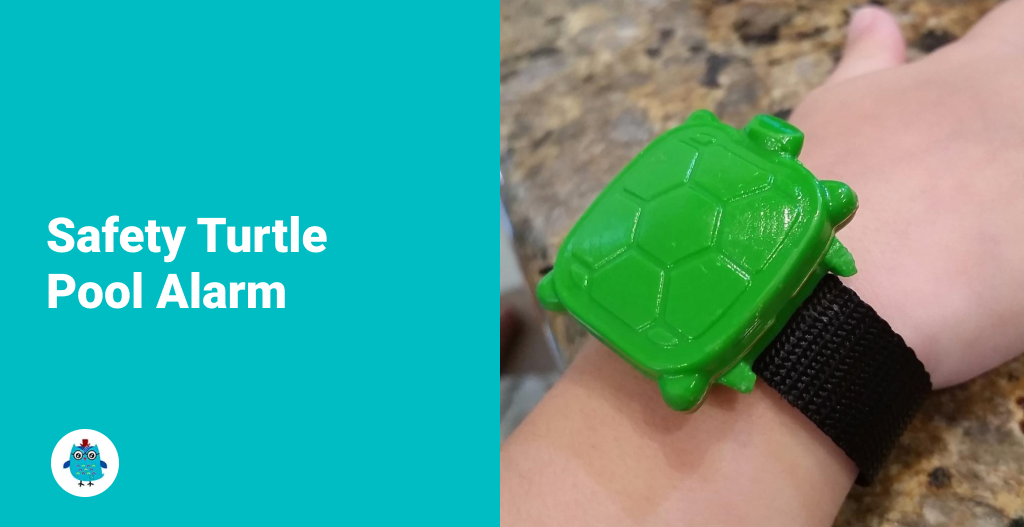
As of 2023, this product is currently unavailable. I don’t know if it will be back soon.
This device package is easy to use. Your kid wears the Turtle wristband whenever they are around the pool area. Next, plug the base within 200 feet. And that’s it.
The base alarm sets off whenever your kid gets in the pool, bringing the Turtle in contact with the water.
What’s cool about Safety Turtle is you can bring it anywhere you’re going for a swim. This alarm can always give you extra security at the beach or the lake.
You can add more Turtles for additional kids. There are even Turtle collars if you have pets.
Pros
- Simple and easy to use
- No installation needed
- Relatively long range
- Portable
Cons
- It becomes more expensive as you add wristbands and collars
- Kids might misplace the Turtles
- Your kids or pets might not like wearing them
For all details, check out the Safety Turtle 2.0 on Amazon here! (currently unavailable)
(currently unavailable)
How to Choose the Best Pool Alarm?
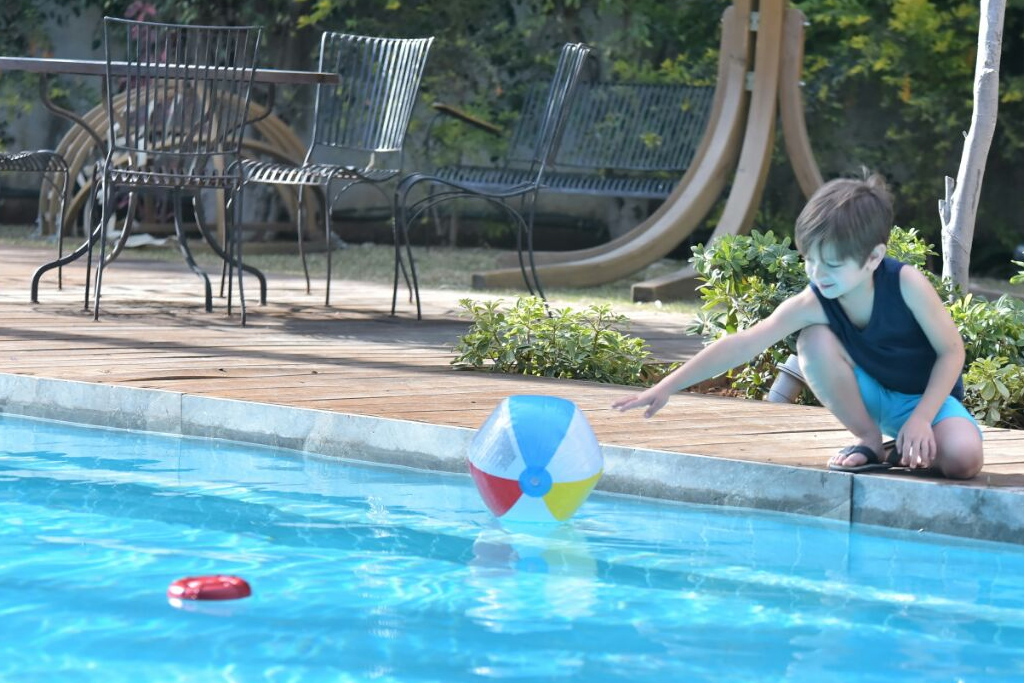
You can’t have all the best features and benefits in one device. This is why it is advisable, if optional, to have at least two security features in and around your swimming pool.
Have one alarm compensate where the other one lacks, and vice versa.
To help you decide which pool alarm to purchase, here are the 7 things you must consider:
- Alarm type: A sub-surface alarm is usually fixed on one part of the pool. You might need to drill holes to screw down the device. It might seem too complicated, but this pool alarm can distract you from false positives. Otherwise, go for floating alarms if you want easier installation. A wearable one is the most convenient for ease of use. A gate alarm is an excellent option to avoid being bothered by cumbersome installation and false alarms.
- Pool setup: The main factor to remember when buying the best pool alarm. Whether you have an in-ground or above-ground pool should be your primary consideration. Related to this is the size of your pool. Some devices work best for small to average pool-size. You wouldn’t want to buy two floating alarms when a single sub-surface device will do the trick. Meanwhile, ask yourself how you would like to install the alarm. Are you willing to drill holes in the side of the pool? Or would you prefer something simpler to set up? You have to make sure that the device you’re looking into is built specifically for the type of swimming pool you have.
- Alarm volume: An alarm you cannot hear defeats the purpose of having the device. However, you wouldn’t want your neighbors complaining about the noise. Consider the distance between the pool and your house. Look at how far away your neighbors are from you as well. And then decide, based on the indicated decibels, a device volume. Below 90 decibels will be best for a smaller backyard. Anything above 101 decibels will be better. A good distance between your house and the rest of the neighborhood is necessary.
- Remote alarm: Your home might be too big for you to hear the siren by the pool. If so, you’ll need a receiver to bring inside your house. This remote alarm will go off with the one by the pool whenever triggered.
- Effective range: The average range of in-home alarms is 200 feet. This can bring the receiver farther beyond the kitchen. 100 feet might be too short, but this range might work depending on the pool’s distance.
- Quality: I don’t believe when people say, ‘You’ll never know until you try. You can learn from other people’s experiences. When looking for the best pool alarm, user reviews are aplenty online. Are the customers happy with the product? What issues did they have, if any? How did they fix those issues? For best results, go with tried and tested brands. Most often than not, these products’ success is due to other users’ satisfaction. Judge the product’s quality through what others say about it.
- Ease of use: Setting the alarm off even when using the pool safely is unavoidable. During summer, this can happen more often. Turning off the alarm or switching the device to swim mode should be manageable. After all, you’re getting the alarm for peace of mind, not a nuisance.
How Much is a Pool Alarm?
Based on the list earlier, you can get a decent pool alarm for as low as $80. The most expensive one is $300 or even more. The best pool alarms can be pretty expensive, but when you think about it, the safety of your children is priceless.
I suggest you consider weighing your options against your budget. Make a list of your favorite, primarily based on the valuable features. Then choose which ones fit the bill.
Buying the best pool alarms is an extremely tiny expense for the safety of your loved ones. Investing more in a life-saving device shouldn’t hurt.
Takeaway
Whether or not a law requires us to have pool alarms, we must keep our facilities safe. It’s already too sad that avoidable accidents still happen daily. Let’s help bring the injuries and death toll down.
With models to choose from, you’re sure to find the best pool alarm for your specific situation. A pool alarm is the best way to save your loved ones.
P.S. Seeking the must-have pool safety device? Check out my list of the best pool safety devices!
From pool alarms to personal flotation devices, this guide covers it all. Regardless if you’re securing an in-ground pool, an above-ground pool, or even a spa, here are the most effective pool safety devices you could get to protect your kids.

